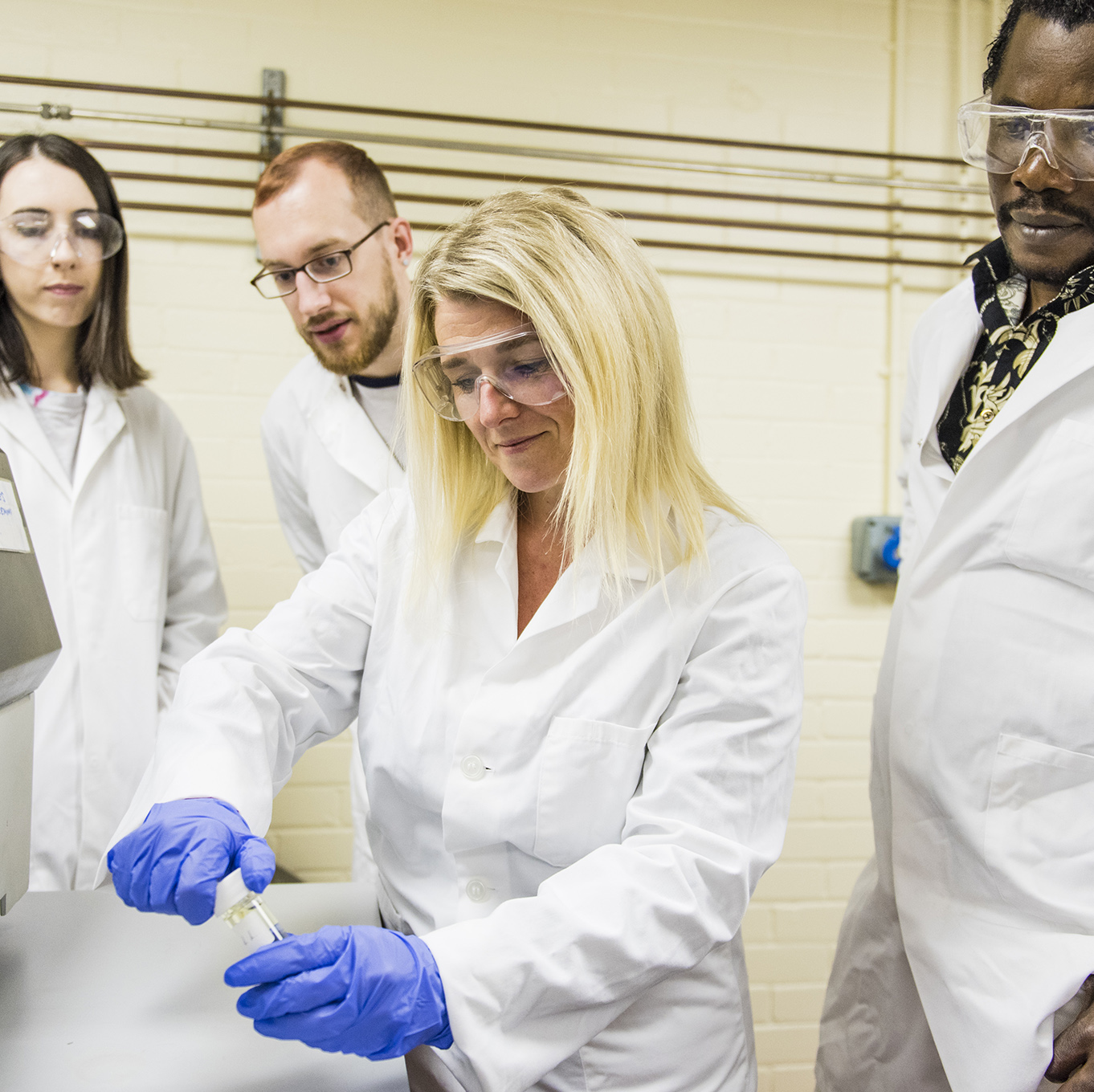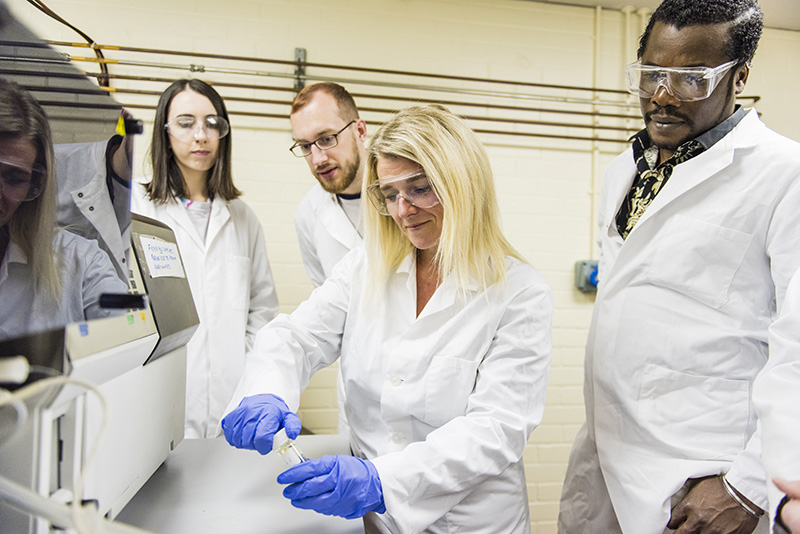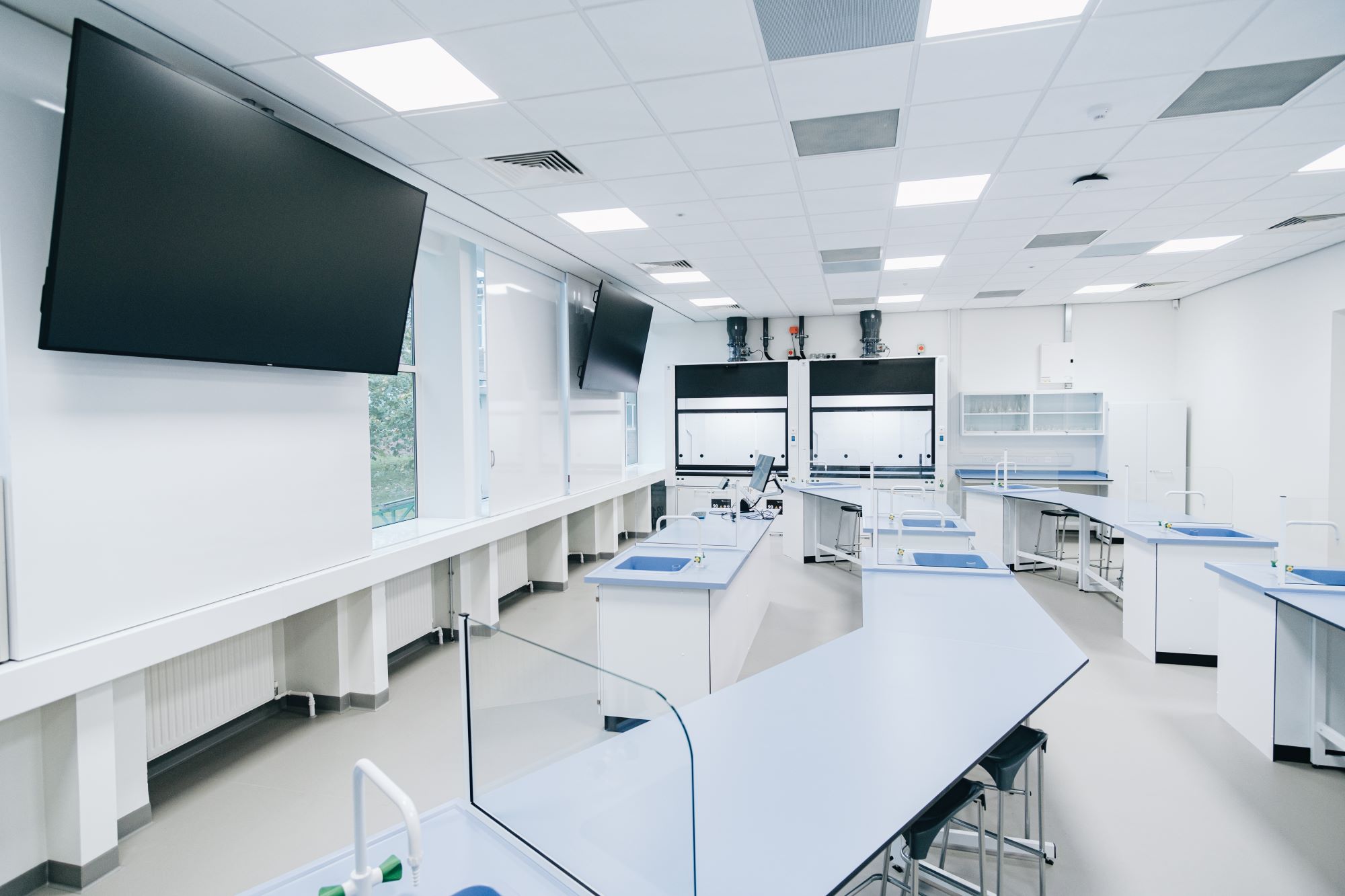BSc (Hons) Biochemistry

Course details
UCAS Code
BC21
Year of entry
2024, 2025
Duration
3 YRS (FT) 6 YRS (PT)
UCAS Tariff
112
Institution Code
G53
Location
Wrexham
Why choose? this course?
Our BSc (Hons) Biochemistry degree introduces students to a range of industry standard and novel techniques focused on producing high quality graduates with excellent further study and employment opportunities.
Modules have been designed to cover the specific criteria of the QAA Biosciences 2019 Benchmarks as well as being aligned to PSRBs such as the Biochemical Society and Royal Society of Biology.
This course will:
- Provide a broad practical based Biochemistry curriculum
- Develop competence in scientific methods of enquiry and problem solving
- Enable you to develop an in-depth knowledge in the field of Biochemistry and acquire a critical awareness of current issues and developments in the subject
- Enable you to learn practical skills in our brand-new teaching laboratories on the Plas Coch campus
- Enable you to integrate into the culture of research from enrolment through to graduation where they will interface with researchers from other disciplines. You will work alongside MRes and PhD students as well as Post-doctoral researchers on independent research projects in both the second and final year of the course
- Adopt an approach to learning and teaching utilising the university Active Learning Framework (ALF), which embraces the importance of flexibility, accessibility and building a sense of community
- Equips you in a wide range of industry standard and novel techniques applicable in Biochemistry.

Studying Biochemistry
Programme Leader, Dr Amiya Chaudhry, introduces our BSc (Hons) Biochemistry course and outlines the career opportunities available.
Key course features
- Highly experienced and research-active staff
- Dedicated laboratories to allow you to gain hands-on practical experience
- Development of skills required within a workplace
- Access to the state-of-the-art facilities in instrumental laboratories
- Inclusive and supportive teaching with tutorial support available through the medium of Welsh
- Content informed by QAA Biosciences 2019 Benchmarks as well as being aligned to PSRBs such as the Biochemical Society and Royal Society of Biology
What you will study
YEAR 1 (LEVEL 4)
Our Biochemistry degree programme begins at level 4 by providing a solid foundation and introduction to the broad disciplines that underpin the subject of biochemistry, resulting in a strong understanding of the subject.
Year one of the programme establishes a platform of core knowledge across key subject areas including biology, chemistry, mathematics and statistics, whilst also introducing you to immunology and microbiology.
MODULES
- Introduction to Chemistry (Core): The aim of this module is to provide you with sufficient background knowledge and insight in chemistry, which is also required to cope with the subsequent modules in the programme you study.
- Cell Biology, Biochemistry & Genetics (Core): The aim of this module is to familiarise you with cell structural components, biochemistry and how cells function, with particular emphasis on genetics and DNA structure.
- Maths and statistics for science (Core): A proper understanding of science, both pure and applied, requires you to have a good working knowledge and understanding of mathematics. This module will bring you up to the required level for university science programmes.
- Essential skills for the Life Sciences (Core): The aim of this module is to develop essential skills in laboratory procedures and techniques and carry these out with due regard to safety and ethics.
- Professional Practice for the Biomedical & Life Sciences (Core): The module aims to introduce you to the theoretical, practical and professional aspects of the Biomedical & Life Sciences.
- Introduction to Immunology & Microbiology (Core): The aim of this module it to equip you with core knowledge in the fields of microbiology and immunology that will enable your successful progression to more advanced study of the topics at levels 5 and 6.
YEAR 2 (LEVEL 5)
Year two of the programme largely comprises specialist modules to give you the necessary knowledge in key areas of biochemistry. You will also primed in research methodology and will design and carry out a mini project to prepare for the final year project.
MODULES
- Advanced Biochemistry (Core): Builds upon the core concepts taught at level 4 and provides you with an in depth understanding on a variety of topics including key biomacromolecules, protein structure/function relationships, enzymatic kinetics/mechanisms, the biochemical underpinnings associated with various diseases, and bioorganic chemistry and its applications.
- Cell & Molecular Biology (Core): The module aims to develop further knowledge and understanding of cell and molecular biology that builds on the anatomy, physiology and cell biology learnt at Level 4.
- Analytical Methods in Applied Science Research Methods, Theory and Practice (Core): This module introduces you to the main techniques used for the isolation and chemical analysis of trace materials.
- Applied and Medical Microbiology (Core): Establish a detailed knowledge of a range of microbial organisms; their structure, life cycles and interaction with hosts.
- Advanced Laboratory Skills for the Biomedical & Life Sciences (Core): The aim of this module is to introduce you to advanced Biomedical & Life Science laboratory techniques, to develop an understanding of Regulatory Issues, Health and Safety, and the application of academic knowledge in a Pathology Laboratory context.
YEAR 3 (LEVEL 6)
The final year of study focuses upon topics at the forefront of current research in biochemistry and will further develop your critical and analytical skills. A significant part of the final year is a 40 credit research project in which you will carry out an independent piece of research in an area of special interest to you.
MODULES
- Research Project (Core): Integrate and apply knowledge gained during your degree studies in a self-motivated, practical, enquiring and problem-solving manner, thereby extending your own learning to a specific area in applied science. To develop your practical research expertise and prepare for postgraduate study/graduate level employment in an area of applied science.
- Structural and Functional Biochemistry (Core): This module aims to bring together knowledge of life’s building blocks: e.g. amino acids, peptides, proteins, lipids and polysaccharides and develop a coherent understanding of how these are organised within cells.
- Biology of Disease (Core): This module aims to develop your understanding of the concept of disease within the context of the normal physiological mechanisms.
- Nanomedicine and Biochemistry Futures Advances in Medicine (Core): Look into the exciting and emerging discipline of nanomedicine and other frontline research and applications of biochemistry, including diagnostics, therapeutics, biosensors and nanotechnologies for regenerative medicine and tissue engineering.
- Drugs & Toxicology (Core): Broaden your scientific and technical knowledge through the exploration of high-profile drug related case studies.
This summer, you can gain the fundamental scientific knowledge and skills needed to progress onto one of our Applied Science degrees, with our Science Summer School.
The information listed in this section is an overview of the academic content of the programme that will take the form of either core or option modules. Modules are designated as core or option in accordance with professional body requirements and internal academic framework review, so may be subject to change.
Entry requirements & applying
The academic requirements for the course are 80-112 UCAS tariff points at GCE A-level or equivalent, including a science at level 3.
Teaching & Assessment
Underpinned by the University's Active Learning Framework (ALF), the course will involve a number of flexible approaches:
- Synchronous (live) and asynchronous (pre-recorded) sessions
- Laboratory practical sessions
- Lectures, seminars and group tutorials
- Self-directed study and independent tasks
A learning blend will be used, which will vary between modules. There will be a minimum amount of on campus activities (3 days per week for each level of the programme), online sessions and interactive activities.
A broad range of assessment methods are used; these include learning journals, group projects, portfolios, coursework, literature reviews, oral and poster presentations, case studies and laboratory reports, and exams/in-class tests. Each module is assessed by a variety of methods, enabling students to display their full potential. A project dissertation will form one of the final parts of your assessment. Most assignments will involve electronic submission.
Wrexham University is committed to supporting our students to maximise their academic potential.
We offer workshops and support sessions in areas such as academic writing, effective note-making and preparing for assignments. Students can book appointments with academic skills tutors dedicated to helping deal with the practicalities of university work. Our student support section has more information on the help available.
In terms of particular needs, the University’s Inclusion Services can provide appropriate guidance and support should any students require reasonable adjustments to be made because of a recognised prevailing disability, medical condition, or specific learning difference.
Career prospects
The course creates wide-ranging opportunities for employment in the following fields:
Biotechnology industry (research and development)
Pharmaceutical industry (research and development)
- Food and water industry (testing, research and development)
- Cosmetics and formulation industry
- Environmental agency
- Medical Sales
- Healthcare support worker
- Veterinary laboratory worker
- Academic researcher
- Teaching
The degree also provides preparation for those students wishing to undertake a career in research, teaching, or to pursue studies towards our MSc Biomedical Science course.
The skills developed in your studies will also ensure employment opportunities outside of immediate bioscience areas, such as management and finance roles.
The BSc (Hons) Biochemistry course is relevant and employer ready, providing a broad and practical-based Biochemistry curriculum. The content is informed by QAA Biosciences 2019 Benchmarks, as well as being aligned to PSRBs such as the Biochemical Society and Royal Society of Biology.
Teaching is carried out in our brand-new laboratories at Plas Coch campus. Our new facilities ensure that students are equipped in a wide range of industry-standard and novel techniques applicable in the Biochemistry field.
Our Careers & Employability service is there to help you make decisions and plan the next steps towards a bright future. From finding work or further study to working out your interests, skills and aspirations, they can provide you with the expert information, advice and guidance you need.
Fees & funding
You do not have to pay your tuition fees upfront.
The fees you pay and the support available will depend on a number of different factors. Full information can be found on our fees & finance pages. You will also find information about what your fees include in the fee FAQs.
All fees are subject to any changes in government policy, view our undergraduate fees.
Programme specification
Accommodation
If you’re looking for a place to stay while you study then take a look at our accommodation pages to get more information on your options, including our on-campus halls of residence Wrexham Village.
.jpg)

